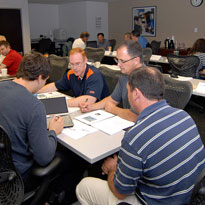WCDMA-GSM Interoperability Tuning
- Course:WCDMA-GSM Interoperability Tuning
- Course ID:WG-INTER Duration:3 days Where: Your Office (7+ Persons)
- Download Course Description (PDF)
Available as a private, customized course for your group at your offices or ours and in some cases as a WebLive(TM) class.
Course Outline
- Introduction to GSM Idle Mode Behavior
- Signal strength measurements
- Initial cell selection: C1 criterion
- PLMN selection
- Cell reselection: C2 criterion
- Tuning the GSM idle mode behavior
- GPRS Idle Mode Behavior
- GPRS implementation on GSM network
- GPRS logical channels
- Initial cell selection
- Initial cell reselection: C31 and C32 criteria
- Tuning the GPRS idle mode behavior
- GSM/GPR -> WCDMA Cell Reselection
- Different planning strategies
- WCDMA initiation of neighbor measurements
- GSM/GPRS -> WCDMA cell reselection
- Tuning the reselection process
- WCDMA Idle Mode Behavior
- WCDMA logical, transport, and physical channels
- Signal strength measurements (RSCP-CPICH)
- Initial cell selection
- PLMN selection
- Cell reselection principle
- WCDMA -> GSM/GPRS Cell Reselection
- Different planning strategies
- GSM/GPRS initiation of neighbor measurements
- WCDMA -> GSM/GPRS cell reselection
- Tuning the reselection process
- GSM -> WCDMA Handover Execution
- GSM measurements on busy mode: The SACCH period
- Handover algorithm
- Basic candidate List
- Radio network features reordering the basic candidate list
- Initiation of WCDMA neighbor measurements
- Criteria for handover execution
- Constructing the inter-technology basic candidate list
- Tuning the handover evaluation
- WCDMA -> GSM Handover Execution
- WCDMA measurements on busy mode: The frame structure
- Handover algorithm on RNC
- Handover events description
- Triggering of handover events
- Criteria for handover execution
- Tuning the handover evaluation
- GPRS -> WCDMA Cell change
- GPRS measurements on busy mode
- Initiation of WCDMA neighbor measurements
- Criteria for cell change
- WCDMA -> GPRS cell change
- WCDMA measurements on PS busy mode
- Initiation of GPRS neighbor measurements
- Criteria for cell change
- Service based transmission rate change
- Course Recap and Discussion
Course in a Nutshell
Operators of heterogeneous GSM/GPRS-WCDMA/HSPA networks face the challenge of setting up WCDMA network parameters for well tuned network interoperability. This is crucial since wrong tuning of the parameters can lead to network overloading in idle (cell selection/reselection) or busy mode (handovers or cell change) of operation and dropped calls or session delays due to excessive outage periods. Appropriate parameter setting depends not only on certain general principles but also on the operator’s network architecture and design strategy. So simple rules of thumb are not often available.
This course will begin with a review of the basic cell selection and reselection behavior of mobile handsets in the network, idle mode behavior from the WCDMA and GSM/GPRS/EDGE point of view, and the parameters that control the cell reselection principles for inter- technology networks. Next, you will study the measurements that the MS performs in GSM/GPRS and WCDMA networks in busy mode as well as signal strength definitions and QoS evaluations. This will be followed by a discussion of the handover evaluation algorithm, including specific features that could change the order of the basic ranking list, and the parameters that could drive selected handovers from GSM -> WCDMA network. We will also study the WCDMA triggering events that could lead to WCDMA -> GSM handovers according to specific formula requirements. The course will conclude with a discussion of the appropriate GPRS WCDMA cell change principles.
Customize It!
If you’d like us to focus the course on a specific network tuning approach (GSM/GPRS or WCDMA fine-tuning) or specific mode of operation (idle or busy mode), we can do that. We can tailor it to a particular vendor’s equipment of interest to your organization. We can also design case studies specific to your network that can be the basis of in-class hands-on exercises.
Aimed At
Engineers who have prior experience with GSM, GPRS, EDGE and WCDMA and wish to learn how to tune the interoperability (handovers and cell reselections) between WCDMA and GSM.

